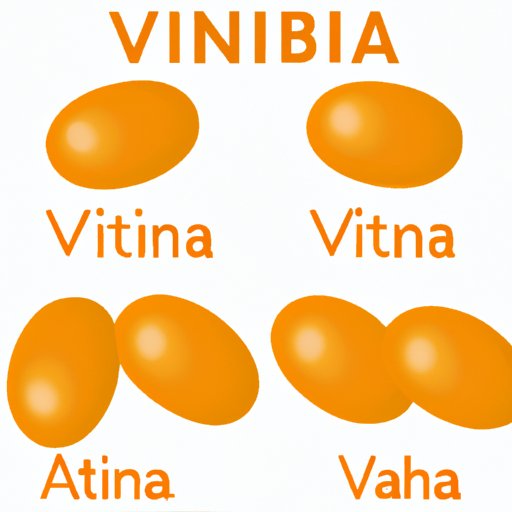
I. Introduction
Antioxidants have become a buzzword in the world of health and wellness, but what are they, and why are they important? Antioxidants are compounds that protect our bodies from free radicals, unstable molecules that can damage our cells and contribute to aging and disease. Vitamin A is a well-known nutrient, but is it also an antioxidant? In this article, we’ll explore the powerful antioxidant properties of Vitamin A and how it benefits our health.
II. Exploring the Antioxidant Properties of Vitamin A
Vitamin A is a fat-soluble vitamin that is essential for our vision, immune function, and skin health. There are two types of Vitamin A: pro-vitamin A, also known as carotenoids, which are found in fruits and vegetables, and retinoids, which are found in animal products like liver, eggs, and dairy. While both types are important for our health, retinoids are more easily absorbed by the body and have stronger antioxidant properties.
III. Why Vitamin A is a Powerful Antioxidant and How It Benefits Our Health
Antioxidants play a crucial role in protecting our bodies from damage caused by free radicals. Vitamin A’s potent antioxidant properties help to neutralize free radicals before they can cause harm. Research has shown that Vitamin A’s antioxidant activity has numerous health benefits, including:
1. Eye health
Vitamin A is essential for maintaining healthy eyesight. Its antioxidant properties help to protect the retina from damage caused by free radicals, preventing conditions such as macular degeneration and cataracts.
2. Immune function
Vitamin A is crucial for maintaining a healthy immune system. Its antioxidant activity helps to protect our immune cells from damage caused by free radicals, allowing us to fight off infections and diseases more effectively.
3. Skin health
Vitamin A is often referred to as the ‘skin vitamin’ because of its powerful ability to promote healthy skin. Its antioxidant properties help to prevent skin damage caused by free radicals, reducing the appearance of fine lines, wrinkles, and age spots.
Compared to other antioxidants, such as Vitamin C and E, Vitamin A has a unique ability to penetrate deep into the skin, making it an effective ingredient in topical skincare products.
IV. The Science Behind Vitamin A’s Antioxidant Effects
Vitamin A’s antioxidant activity is due to its ability to quench singlet oxygen, inhibit lipid peroxidation, and regulate gene expression. Singlet oxygen is a type of free radical that can cause significant damage to our cells, but Vitamin A can neutralize it by donating an electron. Lipid peroxidation is another type of free radical reaction that can cause damage to our cell membranes, but Vitamin A can prevent it by inhibiting the production of certain enzymes. Finally, Vitamin A can regulate gene expression, which plays an essential role in our body’s ability to respond to stress and inflammation.
Scientific studies have shown that Vitamin A’s antioxidant effects can have significant benefits for our health. A study published in the journal Nutrients found that supplementing with Vitamin A improved immune function in elderly individuals. Another study published in the Journal of Investigative Dermatology found that topical application of retinoids improved the appearance of aged skin.
V. Vitamin A: More Than Just a Nutrient, It’s a Potent Antioxidant Too
Vitamin A is much more than just a nutrient; it’s a potent antioxidant that can offer numerous benefits for our health and well-being. While supplements are available, it’s always best to get your nutrients from whole foods whenever possible. Foods that are high in Vitamin A include:
- Sweet potatoes
- Carrots
- Pumpkin
- Spinach
- Mangoes
- Salmon
- Liver
If you’re unable to get enough Vitamin A from your diet, supplements are available in the form of retinoids or carotenoids. However, it’s essential to speak to your healthcare provider before starting any new supplements.
VI. How Vitamin A’s Antioxidant Activity Helps Fight Against Oxidative Stress
1. Understanding oxidative stress
Oxidative stress is a natural process that occurs when free radicals and other reactive oxygen species (ROS) overwhelm our body’s natural antioxidant defenses. This imbalance can cause cellular damage, contributing to aging and disease. While our bodies have natural mechanisms to combat oxidative stress, factors such as pollution, UV radiation, and poor diet can all contribute to an increase in oxidative stress.
2. Role of Vitamin A in combating oxidative stress
Vitamin A’s powerful antioxidant activity makes it a valuable tool in fighting against oxidative stress. By neutralizing free radicals and other ROS, Vitamin A helps to restore balance to our body’s antioxidant defenses, reducing the damage caused by oxidative stress.
3. Final thoughts on Vitamin A’s role as an antioxidant
Vitamin A is a potent antioxidant that plays a crucial role in protecting our bodies from free radical damage. Its antioxidant activity has numerous health benefits, including improved eye health, immune function, and skin health. While supplements are available, it’s always best to get your nutrients from whole foods whenever possible. By prioritizing Vitamin A in your diet, you can help to support your body’s antioxidant defenses and promote optimal health and well-being.
VII. Conclusion
In conclusion, Vitamin A is not only a crucial nutrient for our health, but it’s also a powerful antioxidant. Its ability to neutralize free radicals and combat oxidative stress can have numerous health benefits, including improved eye health, immune function, and skin health. By prioritizing Vitamin A in your diet and skincare routine, you can help to support your body’s natural defenses and promote optimal health and wellness.
Call to action: Make sure to incorporate Vitamin A-rich foods like sweet potatoes, carrots, and spinach into your diet to support your body’s antioxidant defenses and promote optimal health.





